Our research
Research conducted within the Centre for Future Power and Energy Research aims to contribute to knowledge and practice in the field.
Vision
We contribute to the energy research space towards a more sustainable, reliable and cost-effective energy system of the future.
Mission
We are a competent research entity and collaboration partner for the stakeholders in the NZ and international energy sector, by bridging academic research activities and the industrial needs.
Current research areas
Members of CFPER work collaboratively on multiple projects and also co-supervise students across the team. The centre currently has the following research areas:
- Renewable and Sustainable Energy
- Offshore Renewable Energy Systems
- Power systems, power electronics and Smart grid
- Energy conversion, efficiency and conservation
- Hydrogen Economy
- Energy Storage
- Economy Energy, Optimisation and Electricity Market
- Transportation (electric vehicles)
- Stability, Reliability and Resiliency
- Community impacts of renewable and sustainable energy development
Our projects
Our members are actively involved in a number of research projects.
This is a multi-university MBIE research funding received for ‘Architecture of the Future Low Carbon, Resilient, Electrical Power System/ Future architecture network(FAN) - Te Whatunga Hiko as part of the Strategic Science Investment Fund (SSIF) Advanced Energy Technology Platform Research Programmes, a collaborative project of power systems and power electronics researchers from AUT, University of Auckland, Victoria University of Wellington, University of Waikato, University of Canterbury and EPECentre, to future-proof the New Zealand electrical grid.
Funded by:
Ministry of Business, Innovation and Employment (MBIE)
Funding amount:
NZ$13 million for seven-year (2020-2027)
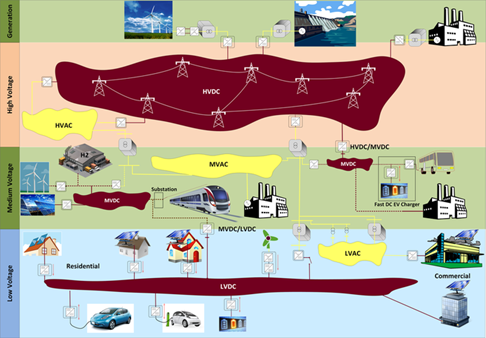
Research Team names from ECMS
- Tek Tjing Lie – Workstream 3 Leader
- Kosala Gunawardane – Key Researcher
- Aphrodis Nduwamungu – PhD student
- Nishita Padmawansa – PhD student
Industry partners
- ABB
- GE
- Transpower
- ETEL
- Unison
- Enatel
External collaborators
- ABB
- GE
- Transpower
- ETEL
- Unison
- Enatel
The project on System Level Modelling of Power Systems underpins the development of BE CRC’s offshore phase of hydrogen DC Microgrid (DCMG) infrastructure. The state-of-art electrical/power system analysis and modelling is used as a tool to achieve the optimal performance scenarios. The project is designed in-association with bench-scale Hydrogen DCMG to carry out real time and hardware in the loop analysis to determine some vital factors such as energy forecasting, fault protection, energy storages and demand side management. The outcome of the project will provide solid grounding of the fine technical details supporting the decision-making of the offshore hydrogen DCMG architecture.
Funded by:
Blue Economy CRC, Australia
Funding amount:
AUD 1,402,815.00
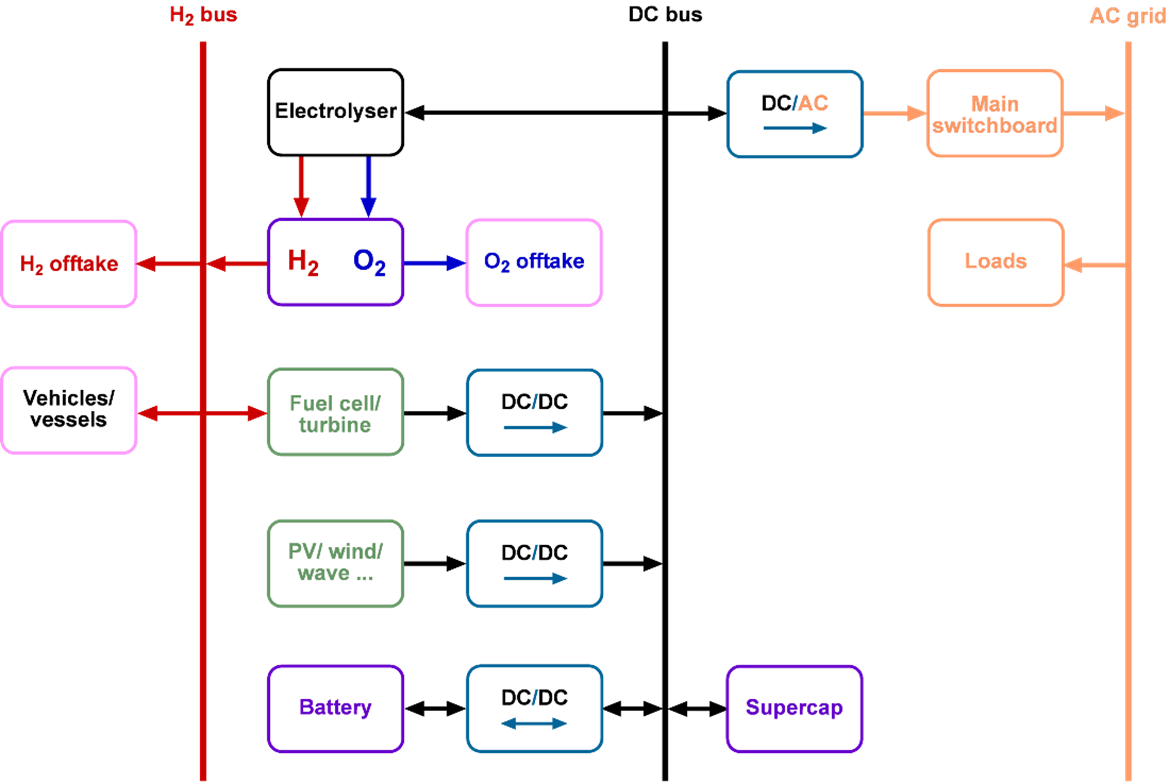
This project is a multi-attribute project with the following three work packages (WPs):
- WP1-Renewable energy resource forecasting
- WP2-Fault protection and control mechanisms
- WP3-Energy storage planning and demand-side management
Research Team names from ECMS
- Dr Kosala Gunawardane (Overall Project lead, WP3 Lead & Researcher)
- Dr Ramon Zamora (WP2 Lead & Researcher)
- Prof Aman Oo (Researcher)
- 2 PhD students (TBD)
- 1 Research Assistant (TBD)
Industry partners
- Optimal Group, Australia
- NZ King Salmon
- Pitt&Sherry, Australia
- Hendsoldt, Australia
ETEL Transformers Ltd are one of Australasia’s largest manufacturers of distribution transformers. Power industry concerns on the impact of future electric vehicle charging loads on distribution transformers are high. ETEL and AUT aim to address these concerns through the development of novel, smart technologies that encompass fibre optic sensing, wireless communication, transformer characterisation and artificial intelligence aspects. The research will result in transformers that are dynamically rated, with loading allowed based on current and predicted levels, as well as temperature, voltage regulation and oil pressure parameters. Strong industry interest in the outcomes of the research exist.
Funded by:
Callaghan Innovation for PhD and postdoctoral research
Funding amount:
NZ$125.000
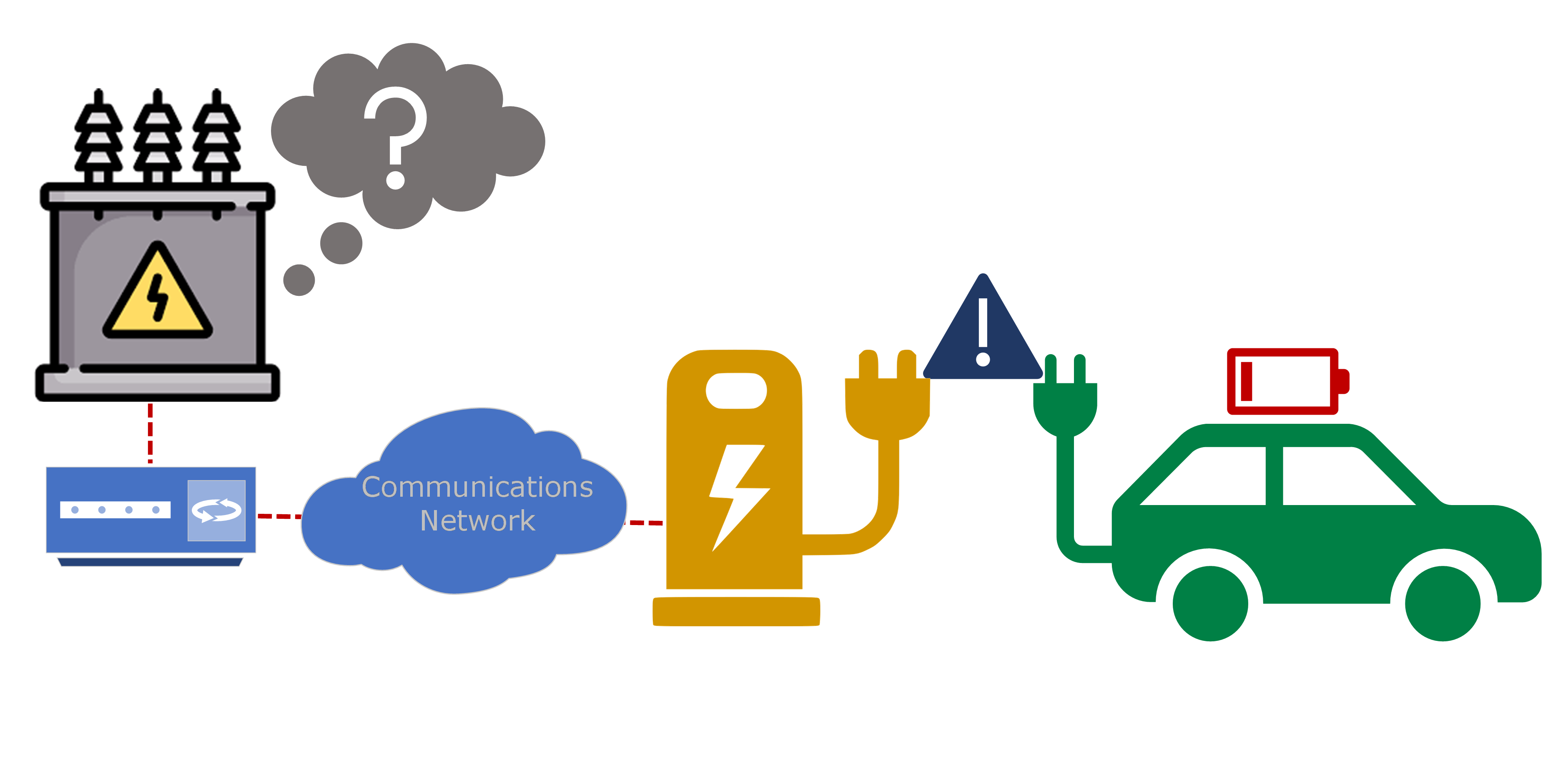
Research Team names from ECMS
- Dr Michael Bunn (PhD (2022) & Postdoctoral Researcher)
- Dr Craig Baguley (Researcher)
- Associate Professor Boon-Chong Seet (Researcher)
How can time changing inertia be monitored using network data and how to optimise synthetic inertia to minimise operational cost of the modern network?
- A data-driven offline inertia estimation technique based on frequency gradient with reduced computation burden is developed
- An online inertia estimation method using recursive parameters estimation with reduced computation burdens is developed
- A long-range forecasting and tracking of inertia values in modern power systems technique is proposed
- A synthetic inertia optimisation tool to minimise the operation cost of modern and future networks is developed
Funded by:
Manaaki New Zealand Scholarship
Funding amount:
NZ$159,297.31
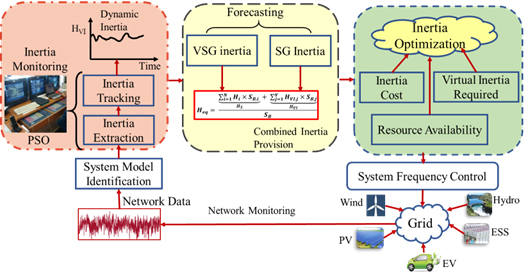
Research Team names from ECMS
- Peter Makolo
- Dr Ramon Zamora
- Prof Tek Lie
Publications
- P. Makolo, R. Zamora, and T.-T. Lie, "The role of inertia for grid flexibility under high penetration of variable renewables-A review of challenges and solutions," Renewable and Sustainable Energy Reviews, vol. 147, p. 111223, 2021. doi:10.1016/j.rser.2021.111223.
- P. Makolo, I. Oladeji, R. Zamora, and T.-T. Lie, "Data-driven inertia estimation based on frequency gradient for power systems with high penetration of renewable energy sources," Electric Power Systems Research, vol. 195, p. 107171, 2021. doi:10.1016/j.epsr.2021.107171.
- P. Makolo, R. Zamora, and T. Lie, "Online inertia estimation for power systems with high penetration of RES using recursive parameters estimation," IET Renewable Power Generation, 15(12), 2571-2585. doi:10.1049/rpg2.12181.
- P. Makolo, J. J. Justo, F. Mwasilu, and R. Zamora, "Fault Ride Through Technique for DFIG-based Wind Turbines Under Grid Three-phase Faults," in 2018 Australasian Universities Power Engineering Conference (AUPEC), 2018: IEEE, pp. 1-5. doi: 10.1109/AUPEC.2018.8757926.
- P. F. Gutman, P. Makolo, and R. Zamora, "Modelling and Analysis of Load Frequency Control in Small Power Systems: a Case Study of New Zealand Network," in 2020 Australasian Universities Power Engineering Conference (AUPEC), Hobart, Australia, 2020: IEEE, pp. 1-6. https://ieeexplore.ieee.org/document/9344473
- P. Makolo, R. Zamora, and T.-T. Lie, "Heuristic Inertia Estimation Technique for Power Networks with High Penetration of RES," in 2020 2nd International Conference on Smart Power & Internet Energy Systems (SPIES), 2020: IEEE, pp. 356-361. doi:10.1109/spies48661.2020.9242923
- P. Makolo, I. Oladeji, R. Zamora, and T.-T. Lie, "Short-range Inertia Prediction for Power Networks with Penetration of RES," in TENCON2021 Conference, Auckland, New Zealand, 2021: IEEE, pp. 1-6. doi: 10.1109/TENCON54134.2021.9707270
How can HEMS algorithm be designed to optimise power consumption and customer comfort and how can the control method be designed to achieve power-sharing, state of charge (SoC) balance for batteries and SoC recovery for SCs?
Research contributions
- To propose multi-time scale optimization algorithm for HEMS
- To minimise energy expenses
- To maximise customer comfort level
- To propose the control method for HESS in DC microgrid
- To achieve power sharing and split.
- To achieve SoC balance among batteries.
- To achieve SoC restoration for SCs.
Funded by:
AUT Vice Chancellor’s Doctoral Scholarships
Funding amount:
NZ$ 75.000
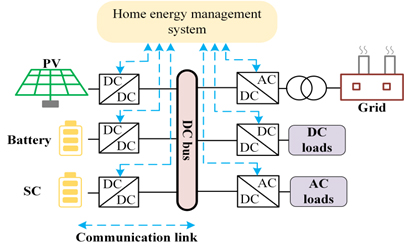
Research Team names from ECMS
- Xin Lin
- Dr Ramon Zamora
- Dr Craig Baguley
Publications
- *X. Lin, R. Zamora, and C. Baguley, “Droop control based on improved virtual impedance in a stand-alone microgrid,” IEEE PES GTD Asia 2019 Conference, Bangkok, Thailand. Link: https://ieeexplore.ieee.org/document/8716027
- *X. Lin, R. Zamora, and C. Baguley, “A fully filter-based decentralized control with state of charge balancing strategy for battery energy storage systems in autonomous dc microgrid applications,” IEEE Access, vol. 9, pp. 15028–15040, Jan. 2021. Link: https://ieeexplore.ieee.org/document/9328435
- *X. Lin, R. Zamora, and C. Baguley, “A Coordinated Droop Controls and Power Management Scheme for Hybrid Energy Storage Systems in DC Microgrids,” in Proc. AUPEC, Perth, Australia, 2021, pp.1-6. Link: https://ieeexplore.ieee.org/document/9597727
- *X. Lin and R. Zamora, “Controls of hybrid energy storage systems in microgrids: Critical review, case study and future trends,” Journal Energy Storage, vol. 47, pp. 103884, March 2022. Link: https://www.sciencedirect.com/science/article/abs/pii/S2352152X21015498
- *X. Lin, R. Zamora, C. Baguley, and Anurag K. Srivastava, “A hybrid short-term load forecasting approach for individual residential customer,” IEEE Trans. Power Delivery (Early access). Link: https://ieeexplore.ieee.org/document/9784906
How could an energy business initiative be utilized to appropriately foster sustainable development in a community?
Research contributions
- A technique for assessing and ranking alternative energy technology in a community based on their impacts on the sustainable livelihood framework capitals based on the interpretive structural modeling and MICMAC analysis approaches.
- A multi criteria analysis approach for assessing and ranking solar photovoltaic modules manufacturing countries by using the lifecycle assessment and importation costs incurred indicators based on the modified VIKOR technique.
- An energy business initiative for solar photovoltaic systems based on the store-on grid scheme model.
- Government expenditure and potential emissions avoidable by adopting solar photovoltaic technology under the store-on grid ;scheme model.
Funded by:
New Zealand Scholarship by the Ministry of Foreign Affairs and Trade, New Zealand
Funding amount:
NZ$ 25.000pa
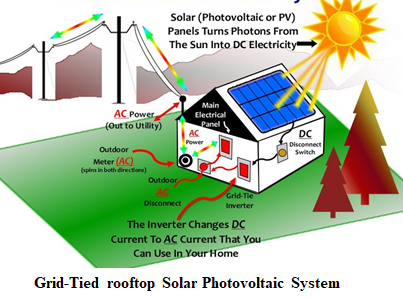
Research Team names from ECMS
- Nicholas Mukisa
- Dr Ramon Zamora
- Prof Tek Lie
Publications
- N. Mukisa, R. Zamora, T. T. Lie, X. Wu, and G. Chen, "Multi criteria analysis ranking of solar photovoltaic modules manufacturing countries by an importing country: A case of Uganda," Solar Energy, vol. 223, pp. 326-345, 2021. doi.org/10.1016/j.solener.2021.05.078
- N. Mukisa, R. Zamora, and T. T. Lie, "Store-on grid scheme model for grid-tied solar photovoltaic systems for industrial sector application: Benefits analysis," Renewable Energy, vol. 171, pp. 1257-1275, 2021. doi.org/10.1016/j.renene.2021.02.162
- N. Mukisa, R. Zamora, and T. T. Lie, "Assessment of community sustainable livelihoods capitals for the implementation of alternative energy technologies in Uganda–Africa," Renewable Energy, vol. 160, pp. 886-902, 2020. doi.org/10.1016/j.renene.2020.06.132
- N. Mukisa, R. Zamora, and T. T. Lie, "Store-on grid scheme model for grid-tied solar photovoltaic systems for industrial sector application: Costs analysis," Sustainable Energy Technologies and Assessments, vol. 41, p. 100797, 2020. doi.org/10.1016/j.seta.2020.100797
- N. Mukisa, R. Zamora, and T. T. Lie, "Feasibility assessment of grid-tied rooftop solar photovoltaic systems for industrial sector application in Uganda," Sustainable Energy Technologies and Assessments, vol. 32, pp. 83-91, 2019. doi.org/10.1016/j.seta.2019.02.001
- N. Mukisa, R. Zamora, and T. T. Lie, "Viability of the store-on grid scheme model for grid-tied rooftop solar photovoltaic systems in Sub-Saharan African countries," Renewable Energy, vol. 178, pp. 845-863, 2021. doi.org/10.1016/j.renene.2021.06.126
- N. Mukisa, R. Zamora, and T. T. Lie, "Diffusion forecast for grid-tied rooftop solar photovoltaic technology under store-on grid scheme model in Sub-Saharan Africa: Government role assessment” Renewable Energy, vol. 180, pp. 516-535, 2021. doi.org/10.1016/j.renene.2021.08.122
- N. Mukisa, R. Zamora, and T. T. Lie, " Multi criteria analysis of alternative energy technologies based on their predicted impact on community sustainable livelihoods capitals: A case of Uganda,” Renewable Energy, vol. 182, pp. 1103-1125, 2022. doi.org/10.1016/j.renene.2021.10.103
How to assess and ensure the power grid's security under high penetration of RES-DG units, network contingencies, and other grid components and how to enhance the interaction and coordination between the future transmission and distribution system (TSs and DSs) for voltage and frequency controls?
Research contributions
- A security-constrained optimal RES-DG placement technique using a decision tree classification approach with novel indices.
- A novel grid security state prediction technique using density-based clustering and a probabilistic machine learning approach.
- A state-of-art online security prediction and control method using an incremental machine learning model training process.
- A state-of-art online security prediction and control method using an incremental machine learning model training process. A novel two-level security-constrained method for optimal flexibility operation for frequency and voltage support.
Funded by:
Manaaki New Zealand Scholarship
Funding amount:
NZ$159,297.31
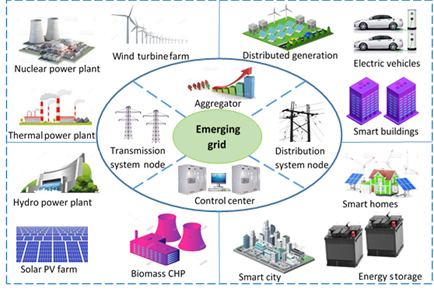
Research Team names from ECMS
- Ifedayo Oladeji
- Dr Ramon Zamora
- Prof Tek Lie
Publications
- Oladeji, I., et al. (2021). Optimal Placement of Renewable Energy Sources Distributed Generation in an Unbalanced Network for Modern Grid Operations. 2021 International Conference on Smart Energy Systems and Technologies (SEST).DOI: 10.1109/SEST50973.2021.9543204
- Oladeji, I.; Makolo, P.; Abdillah, M.; Shi, J.; Zamora, R. Security Impacts Assessment of Active Distribution Network on the Modern Grid Operation—A Review. Electronics 2021, 10(16), 2040. https://doi.org/10.3390/electronics10162040
- Oladeji, I.; Zamora, R.; Lie, T. An Online Security Prediction and Control Framework for Modern Power Grids. Energies 2021, 14(20), 6639. https://doi.org/10.3390/en14206639
- Oladeji , I., et al. " Density-based clustering and probabilistic classification for integrated transmission-distribution network security state prediction ", Electric Power Systems Research, vol. 211, p. 108164, 2022. https://doi.org/10.1016/j.epsr.2022.108164
How to design an optimal energy management system for PV based EV charging under energy market environment and how to improve the energy management system for PV based EV charging by incorporating multiple parameters like system uncertainties, energy arbitrage, user preferences and energy market dynamics for a realistic application?
Research contributions
- A novel optimal transactive trading mechanism for EVs in parking lots incorporating system uncertainties.
- A novel local energy trading approach incorporating conflicting participating agents objectives and optimised using Grey Wolf method.
- A state-of-art regression based forecasting of household load demand using various predictor variables.
- A novel transactive trading algorithm accounting for varying user behaviour, impact of Covid, placement of EVs.
Funded by:
Manaaki New Zealand Scholarship
Funding amount:
NZ$159,297.31
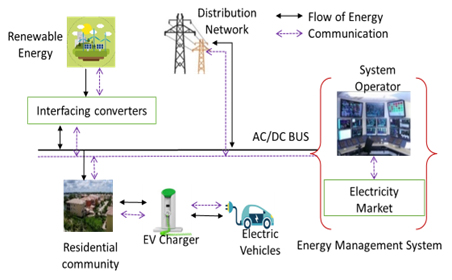
Research Team names from ECMS
- Asaad Mohammad
- Dr Ramon Zamora
- Prof Tek Lie
Publications
- Mohammad, A., Zamora, R., & Lie, T. T., (2020). Integration of Electric Vehicles in the Distribution Network: A Review of PV Based Electric Vehicle Modelling. Energies 2020. 13(17):4541; Link: https://doi.org/10.3390/en13174541
- Mohammad, A., Zamora, R., & Lie, T. T. (2021) Transactive Energy Management of PV-Based EV Integrated Parking Lots. IEEE Systems Journal vol. 15 no. 4 pp. 5674-5682 Dec. 2021. Link: https://doi.org/10.1109/JSYST.2020.3043327
- Mohammad, A., Zamora, R., & Lie, T. T. (2022). Energy Management for EV Participation In Local Energy Markets. In 2022 IEEE Transportation Electrification Conference & Expo (ITEC) (pp. 1327-1331). IEEE. Link: https://doi.org/10.1109/ITEC53557.2022.9813748
How can fuel cells be intergraded into DC Microgrids as a hybrid system with the assist of supercapacitors to address the issues with the poor dynamic response?
Research contributions
- Improve the dynamic response capability of DC microgrids.
- Support to enhance the clean power generation.
- Available energy resources can be optimize to get economic benefits.
Funded by:
Ministry of Business, Innovation and Employment
Funding amount:
Part of the FAN project
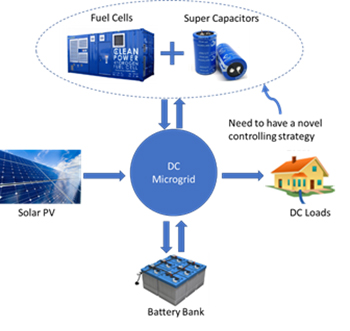
Research Team names from ECMS
- Nisitha Padmawansa
- Dr Kosala Gunawardane
- Dr Kasun Subasinghage
- Associate Prof. Nihal Kularatna
- Prof Tek Lie
Publications
- Gunawardane K, Padmawansa N, Kularatna N, Subasinghage K, Lie TT. Current Context and Research Trends in Linear DC–DC Converters. Applied Sciences. 2022; 12(9):4594. https://doi.org/10.3390/app12094594
How can the oscillation stability of the power grid be monitored in real time using instantaneous PMU data to control the effects of emerging sub synchronous oscillations occurring due to the addition of wind energy sources and power electronic devices associated with them and how can increased PV penetration in the grid be used effectively to suppress the emerging sub synchronous oscillations to enhance power system stability?
Research contributions
- To propose a real-time monitoring tool to detect the occurrence of SSO
- To observe SSO conditions in type 1, type 3 and type 4 wind farms
- To propose a PV system based SSO damping controller using WAMS signals
- To accommodate the communication latency in WAMS signals
- To maintain frequency control during lower levels of irradiation
Funded by:
AUT Doctoral Fees and Stipend Scholarship
Funding amount:
NZ$ 25.000pa
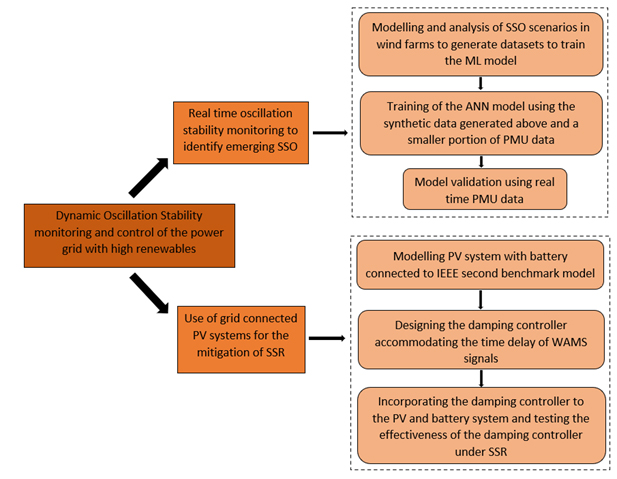
Research Team names from ECMS
- Uvini Perera
- Prof Aman Oo
- Dr Ramon Zamora
How will the top-down (TD) approach work to build a forecasting model for hierarchical load structure in the residential sector and how does electricity price impact the forecasting model?
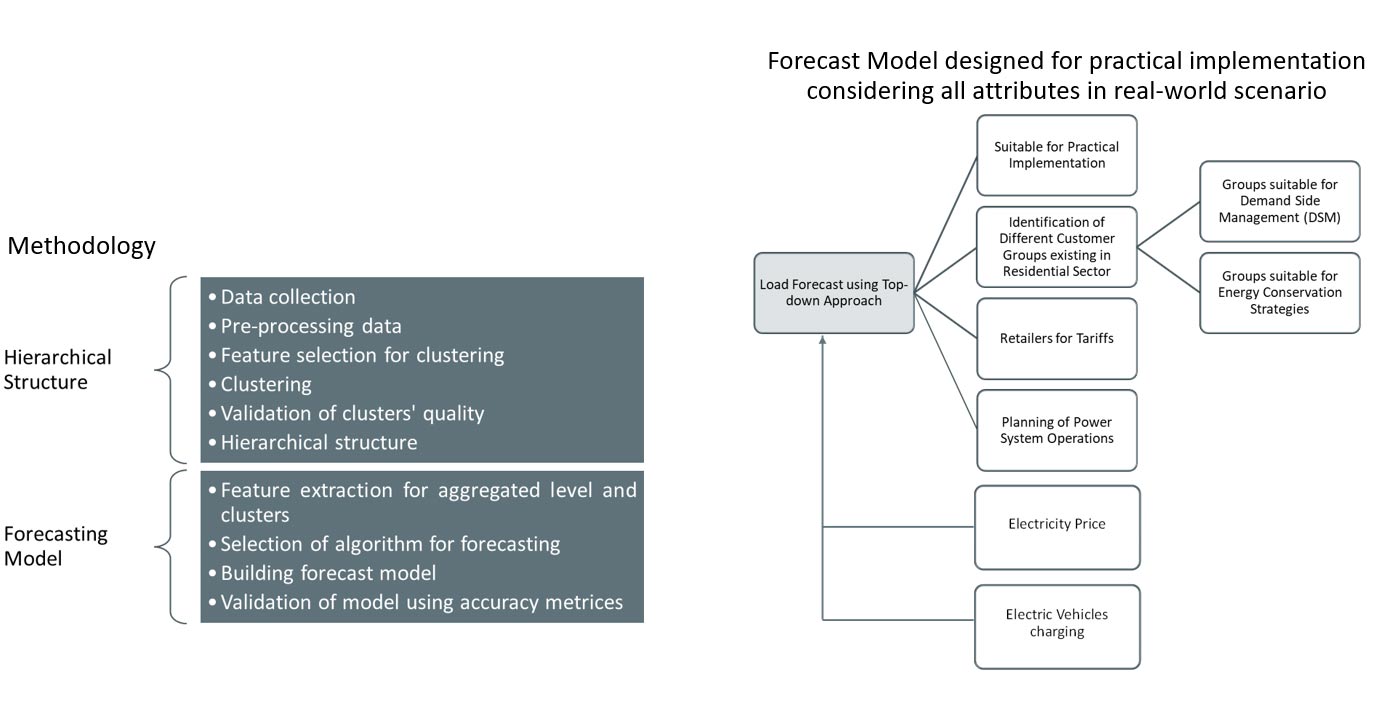
Research Team names from ECMS
- Barkha Parkash
- Prof. Tek Tjing Lie
- Dr. Weihua Li
- Dr. Shafiqur Rahman Tito
Publication
- Parkash, B., Lie, T. T., Li, W., & Tito, S. R. (2022, April). Hierarchical Structure Based Energy Consumption Forecasting in Top-Down Approach. In 2022 7th Asia Conference on Power and Electrical Engineering (ACPEE) (pp. 1732-1737). IEEE.
Research networks
CFPER works collaboratively with industry, research institutions and universities to solve problems related to power and energy for better futures. We are involved in the following collaborative networks:
Meet the team
Members of CFPER work across multiple projects and co-supervise students. Find out about our members' expertise, our current students and alumni.